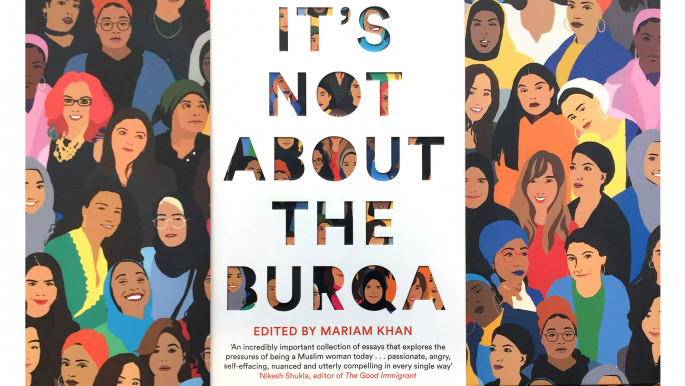My Past Is a Foreign Country: A Muslim feminist finds herself
It's a common preoccupation for many women the world over. We think we're not enough – not good enough, not pretty enough, not clever enough, not pliable enough.
For Talkhani, those feelings were multiplied by the fact that she grew up in a country (Saudi Arabia) and a culture (Indian) that both have very set ideas about the place and role of women.
In her book, Talkhani explores how she was shaped by her status as an outsider, first as an Indian in Saudi Arabia, then as an Indian and a Muslim in Germany and the United Kingdom, and everywhere as a girl and woman who wanted more than society wanted to give her.
Racism forms a core part of the outsider status that Talkhani has lived with for much of her life, so it's no surprise that her look at racism is nuanced and wide-ranging, and often ties in with her feelings about belonging.
 |
| Read also from The New Arab's Book Club: It's Not About the Burqa: It's about letting Muslim women speak |
Recalling a time she witnessed a car accident between a Saudi man and a South Asian man which ended in the former physically attacking the latter, Talkhani recalls that "we all knew our precarious place in this country of plenty".
"Being immigrants in a place where Asians were treated like second-class citizens was an integral part of my childhood," she continues.
After university, Talkhani persuaded her father to let her study in Germany for a year, a move that she hoped would offer her a new sense of self, and which would help her escape the feeling of not belonging in Saudi Arabia.
"In India," she writes, "I was too foreign, too Muslim. In a Western space, I thought I could be myself. That I could stand out and be celebrated for my differences. It would be a truly inclusive space, I thought."
Of course, that wasn't to be the case, and it's interesting to read about Talkhani coming to terms with the different, more subtle forms of racism – the micro aggressions – that she found in Germany and then, later, in the United Kingdom.
Talkhani's identity has been shaped by the places she's lived, but also by her family, and in particular her mother, who fulfilled a very traditional wife and mother role. It is her fraught and complicated, yet loving, relationship with her mother that is at the centre of this memoir.
Talkhani examines how her mother's words and actions, as well as the things she didn't say or do, affected her as a young woman trying to find her way in the world. The book, says Talkhani, "is as much about Mama's silences as it is about my words, and the lingering discordance this caused".
It is, says Talkhani, "this discordance that has driven me and shape me, the inability to look away, to ignore, to forget, to be mollified, and to believe that nothing out of the ordinary has happened, is happening".
One thing that caused a rift between Talkhani and her mother was Talkhani's hair loss. Talkhani grew up in a community that saw a girl's beauty as key to her worth and to her future prospects, namely marriage, and the loss of hair, which began when Talkhani was a child, was seen as a threat to those prospects.
Talkhani's efforts to cover up her hair loss, the way she is treated by family members, her mum's devastation at the loss of Talkhani's hair, and the subsequent treatments (some painful) to reverse the loss make for difficult but moving and essential reading.
Talkhani's acceptance of her hair is inspirational to any person who has ever felt they don't fit into a beauty standard prescribed by someone else.
"The past is a foreign country: they do things differently there," reads the opening line of LP Hartley's The Go-Between.
Talkhani has made a life out of doing things differently, out of not accepting the status quo or living her life by other people's standards.
My Past is a Foreign Country is a must-read memoir, made all the more so by the vulnerability and honesty with which Talkhani writes.
Sarah Shaffi is a freelance literary journalist and editor. She writes about books for Stylist Magazine online and is books editor at Phoenix Magazine. She is a judge for the Jhalak Prize 2019. Sarah is editor-at-large at independent children's publisher Little Tiger Group. She regularly chairs author events, and is co-founder of BAME in Publishing, a networking group for people of colour in publishing.
Follow her on Twitter: @sarahshaffi
The New Arab Book Club: Click on our Special Contents tab to read more book reviews and interviews with authors:




